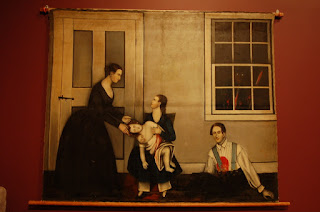THE MAN ON THE WASH TUB
“Never did the word of God appear more precious to any one than it did to Jacob [Jack Hodges.] In reply to my questions respecting his interest in Scriptures, he said, “Master, if you will believe me, I have come into my cell at night, and setting my supper on my cot, I have taken my Bible and become so much engaged in reading and meditating upon its truths, that I wholly forgot my meal, till I saw it untouched in the morning.”- Rev. Ansel Doane Eddy, Black Jacob 1842
“I asked Freeman if he could read.” local merchant Ira Curtis told the jury. “He said he could. Rev. Austin a clergyman of this village came into the cell where we were. He took up a testament that was laying there, opened it, and handed it to Freeman and asked him to read it. He undertook to do so, and commenced by repeating the words, “O’ Lord Jesus Christ Almighty, mercy Moses……” and continued in that way, but sometimes using words that I could not understand and which I doubt were to be found in any language… I took the book from his hand and said “You do not read right.” He replied that he did. I said again “You cannot read.” He said “Yes I can.” I said “you don’t read right. He said “Yes I do.”
“Then I asked him again why he killed them;” Rev. John M. Austin testified, ”whether he thought it right to kill an innocent child? I understood from his gestures in reply, that he was in a labyrinth from which he was incapable of extricating himself.”
Interview with William Freeman in his Auburn Jail cell:
By Dr. Sylvester Willard
Q. Bill, did you kill them?
A. Yes
Q. What did you kill them with?
A. Well, I killed them with a butcher knife.
Q. Where did you get your knife?
A. Why, I bought it- I bought two.
Q. What did you give for them?
A. I gave one and six pence for one.
Q. Can you tell me the whole story?
A. I took the knife and carried it home to my room and hid it. Well, I let it lie there until I got ready to go out and kill. I went upstairs and threw it out the window, so they shouldn’t see me when I went downstairs. I went downstairs, myself, and went round and got my things and then went off south.
Q. Where’d you go off to?
A. I went up to Van Nest’s.
Q. What did you go there for?
A. I went there to kill them.
Q. What did you do when you first went there?
A. I saw a light in the house and didn’t go in.
Q. How long did you stay outside the house?
A. I stayed a little while.
Q. What did you do then?
A. I went in the house. I saw Mr. Van Nest and stabbed him.
Q. Did you kill him?
- Yes.
The literacy question remains for both Jack Hodges and William Freeman. Unlike the author, Austin Reed, it is doubtful either man could read or write. For Freeman I think it was a certainty that he could not. Jack, I’ll give the benefit of the doubt. There is a remote possibility that Hodges learned to read in prison. As with all indigenous peoples and slaves, literacy and education of the poor, convicts, and all people of color, were routinely withheld by white authorities; weaponized as a way of marginalizing and controlling large swaths of the population. The so-called “rule of law” is always codified in specific language, ofttimes purposefully unintelligible. Today the English language, and its legal intricacies, are routinely used against the poor and foreign immigrants, as a way of confusing the individual, speeding up incarceration and deportation. It’s right there in black and white.

Comments
Post a Comment